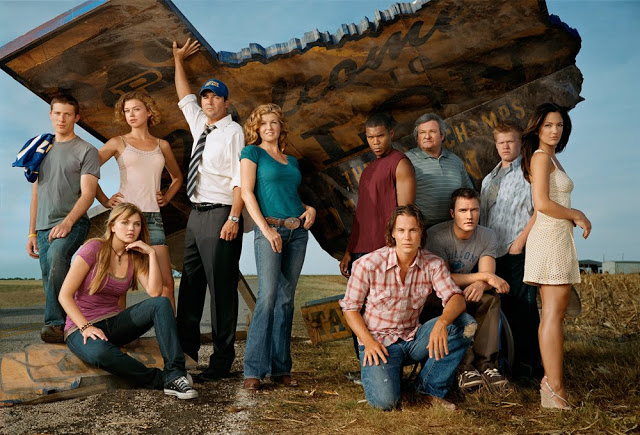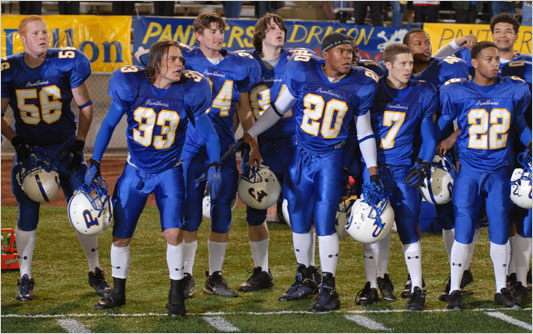How we all slept on Friday Night Lights and why that is unacceptable.
The history of Television is full of winners and losers: For every Wire, there is a Baby Talk, and for every Friends a Joey. How we judge who wins and who loses is somehow widely universal, but still prone to subjectivity. How long did it air? Did it get good ratings? Was it nominated for any awards that WEREN’T Nickelodeon Teen Choice Awards? Was it hailed by critics? Criteria like this is fine in separating the undeniable successes in the traditional sense from the flops but it doesn’t get us any closer to agreeing on what is good, great, or just some “huge mistake.”
In a perfect world, none of the above would matter. A Television series would be judged on the merit of its content and quality; ratings just some archaic yard stick that measures popularity, which should never be a true gauge of achievement in any medium. Would Gagnam Style or any LMFAO song ever be a success in the same way as any Beach Boys song even if they were to sell the same amount or records (downloads in today’s industry) or have an impressive number of YouTube views? In a purely capitalistic sense, the answer is always yes, but I’m sure that we can all agree that what makes a show (or movie, or song etc.) a true success is more than that. It is the story it tells and the contribution it makes to the medium it uses, its long term legacy a far better indicator than what any number says, whether it be viewers, points/shares, or number of episodes it lasted.
Still, ratings have always been, and continue to be, a factor that make or break a television series and many that we would call noteworthy have suffered from poor ratings. Usually when this involves a critical darling, the network starts chasing the ratings by switching times and nights in an attempt to find the right combination of shows or the perfect lead in that will translate critical accolades into the traditional successes that advertisers are looking for. Sometimes this prolongs the inevitable but it at least gives the series a chance to find the audience that it was meant for and hopefully grow that audience through word of mouth. Even if the series gains a following- fanatical, organized ones in the case of the truly special underdogs- networks leave very little wiggle room in regard to how long they have to court viewers before they are forced to quickly wrap up any outstanding story lines and say adieu, their legacy to live on in syndication and all praise now heaped on retrospectively. Unless the show is Community and NBC just lost their two biggest comedies in the same season. (Six seasons and a movie?)
Many series have been victim of this early exit, or at least a run pestered by poor ratings and the consequential network tinkering and shuffle. In recent years this has affected Judd Apatow “failures” Freaks and Geeks, Undeclared, and The Ben Stiller Show as well as other Fox comedies Family Guy, and Arrested Development (Stiller and Arrested Development won Emmy awards AFTER being cancelled, a Best Comedy Series award for A.D.) The trend isn’t limited to comedies or Fox…though they are notorious for the two- season series, Family Guy even poking fun at this trend in their triumphant return to the network that pulled their plug years before. Firefly is generally lauded as a superb sci-fi series with writing and production pedigrees in the crew that brought the world Buffy The Vampire Slayer, yet was cancelled before finishing its 14 episode run (Fox to blame again). It even led to a movie, which has done even better than the series leading to discussions on the parallels between it and and the granddaddy of all Sci Fi series cancelled only to have a fanatical following in death: Star Trek which despite its legacy and the 13 Emmy nominations that it garnered, only ran from 1966 to 1969.
In past years syndication and DVD sales or rentals accounted for most of the proliferation of “good but gone” TV. This system had worked for many years and I was fortunate to be able to fall in love with many series this way, but ultimately it was both time consuming and costly. Buying DVD box sets adds up, even if you are getting them used, as do the costs of renting a seven disc series individually. Syndication, initially brought “streaming” content I suppose, but your ability to view an entire series was still to whether or not you could be around a television when it would be airing. Plus, while some series would be shown in in chronological succession, others are aired in no discernible order whatsoever, not really allowing one to experience the series as intended.
Luckily for us, the world has become more and more perfect over the past ten years or so…at least in terms of television viewing. Never has it been easier to view what you want whenever you want it. What started with the mainstreaming of peer to peer file sharing via programs like Napster has given way to the rental of TV episodes on iTunes and Amazon. Netflix first provided what felt like an infinite amount of possibilities when renting television DVDs in comparison to the selection at video stores, which were always hampered by a pesky thing called a limited amount of physical space. Between the selection and the relatively cheap cost of a three-discs-at-a-time plan (prior to the billing plan changes), one could devour whole seasons as fast as they wanted to…and as fast the US Postal Service would allow. Even DVRs helped us manage this, but they too are a cause for families’ entertainment budgets to soar, adding to the cost of one’s cable bills.
The introduction of their streaming services for a monthly flat rate would help solidify the revolutionary shift in industry practices geared towards giving viewers the ability to watch at their convenience. Hulu would follow, as would HBOGO which maintains their exclusivity. And if all else fails you can always find whatever you are looking for in less than legal ways like bit torrents. The information superhighway is more like an information super cable box.
This relative ease of access of has had profound effects on how we as viewers digest TV shows. This coupled with the sophistication in the means that we as a culture talk about television and the shared experience of viewing ALL of this endless content would guarantee that what was good would eventually get its day in the sun – even if it was cancelled prematurely due to it not connecting with a big enough audience. Prior to the complete saturation in our lives by social media, like-minded fans would find each other on internet message boards and chat rooms. They would celebrate this common love, at the same time feeling “in the know,” having a secret that much of society was clueless about. I KNEW how good Buffy the Vampire Slayer was regardless of whether or not everyone else recognized the fact. Today’s accessibility means that ANYONE can discover the secret and can talk about it on Facebook, Twitter, or more TV oriented social media like Get Glue. Being a TV junkie was suddenly in fashion. It is not uncommon to hear the phrase, “Don’t tell me what happened, I’m only on the third season,” or “no spoilers please” because now we are all in a process of “catching up” on some series or another.
The end result of all this is that television consumption has become a truly democratic process, turning more and more series into the winners they are but that viewers never realized. A show’s popularity was determined by so much more than the traditional measures of ratings and shares of viewing audiences. Downloads and Netflix views matter, as do the frequency things are mentioned in social networks. Hashtags count, and the companies that make the TV we love are reading them. This has enabled the resuscitation of the previously left for dead. DVD sales and success in syndication led Fox to bring back Family Guy in the way that DVD sales and incredibly strong streaming numbers led to Netflix reviving Arrested Development after five years.
Just like many before it, Friday Night Lights was never successful according to the old paradigm, even though it was critically received. This is nothing new, yet despite its availability on Netflix streaming it has yet to experience the near total surge in popularity in the culture- at- large that Arrested Development has which is a shame: because it is one of the best shows ever to be on television.
I know what you are thinking. “Josh, with so many great shows, ESPECIALLY in the past 20 years, how can you make such a statement?” I probably sound crazy, or at least reckless in my words, but I truly believe that Friday Night Lights is near perfect. Possibly top 5. Definitely top 10. And I don’t mean “Josh Richer’s Top 10 TV shows” either; I mean that it legitimately should be considered to be in the top 10 of all the shows ever made. Any list that DOESN’T include it is complete rubbish and should be given little attention.
So what makes FNL THAT good? The short answer is “everything”, but obviously the details are where the beauty lies. If you haven’t seen it, you really should reconsider your lifestyle choices, but I’ll try to fill you in without spoilers. The show follows a fictitious high school football team from a fictitious town (The Dillon Panthers of Dillon, Texas) and their coach on the precipice of a much anticipated season. Things happen that no one could, foresee, but life marches on for Dillon as life always has a tendency of doing; a procession of tragedy and triumphs, that are always at the mercy of chance. What makes Friday Night Lights so damn great is that it provides an articulately done representation of life that accurately portrays how the control we have over our “destiny “only goes so far-a product of both our decisions and the decisions of others -and that each moment of our lives are ephemeral: What one person does in Dillon can affect any other person, just as our own relationships are often crucial determinants of the trajectory of our lives, and in Dillon life is always in progress. Characters are almost always flawed, life made up of many shades of grey, nothing and no one truly black or white.


